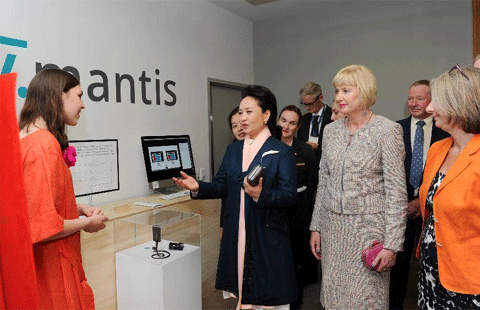Time bomb in Asia-Pacific
Updated: 2014-11-21 07:38
By Li Haidong(China Daily USA)
|
||||||||
Washington's persistence in pushing its pivot to Asia strategy reveals the fragility of US power and its Cold War mentality
Prior to his departure from the recently concluded G20 Summit in Australia, US President Barack Obama, in a speech at the University of Queensland on Saturday, stressed that the Asia-Pacific region would remain a "fundamental focus" of US foreign policy and pledged to deepen the US' military engagement in the region. Obama's words, confirming Washington's strategic shift toward the Asia-Pacific in a bid to consolidate its global leadership, revealed the fragility rather than the might of US dominance.
For starters, by pledging to enrich its military ties and trade relations with Asian countries, the Obama administration sought to allay concerns among its allies about the US commitment to the Asia-Pacific region. Washington's over-emphasis on strengthening its regional military alliances, however, exposes its real attempt to cut off Asia-Pacific integration, in which Asian countries have been the major driver.
Obama's pledge to boost "maritime security capacity building" in the Pacific Ocean further demonstrates Washington's growing sense of unease over China's growing regional influence.
Obama further prioritized the controversial Trans-Pacific Partnership Agreement in his pivot to Asia strategy. The TPP, covering only 12 trans-Pacific members among which Washington and Tokyo are still haggling over agricultural tariffs, does not even convince the US Congress. Worse still, in hoping to maintain US leadership in the region it deliberately excludes China, a major driver of the Asian economy.
Hence, instead of boosting the regional economy in the Asia-Pacific in the long run as designed, the US-led TPP actually hampers freer trade and economic integration by promoting parochial exclusion. That explains why China would choose to cooperate with the Association of Southeast Asian Nations in a Regional Comprehensive Economic Partnership and why it pushed for the Free Trade Area of the Asia-Pacific during this month's 2014 APEC meeting in Beijing.
In addition, although repeatedly claiming to have shifted its focus to the Asia-Pacific, the Obama administration has never actually managed it. During his first tenure, Obama was too occupied with Middle East affairs, including the "Arab Spring" uprisings and with the withdrawal of the US forces in Afghanistan. In the first two years of his second term, he has been preoccupied by Syria, Ukraine, and the rise of the Islamic State. The geopolitical conundrum of neglecting one or the other, reflects Washington's inability to globally govern alone.
Lastly, regarding the pivot to Asia strategy, there is a substantial divergence of opinion within Washington. Given their various strategic focuses, organizations including the National Security Council and State Department never reached a consensus on this Asia policy. The drubbing of the Democratic Party in the US midterm elections has made it even harder for him to push for consensus on his pivot to Asia policy.
Obama's Asia-Pacific pivot was aimed at reconstructing the political and economic order within the Asia-Pacific region. The strategy is essentially based on the outdated Cold War mentality that still exists in the US and its attempts to build an Asia-Pacific security based on US-led alliances. That also explains why it has been playing up issues concerning the South China Sea and East China Sea - mostly the territorial disputes between China and its coastal neighbors - to provoke rising tensions.
By bringing tension instead of stability to the region, the Asia policy of the Obama administration did not work out well in practice and will leave a considerable burden for his successor in two years.
Few people would like to see a Cold War in Asia, after witnessing the US-led security mechanism is producing a "new Cold War" in Europe with the Ukraine crisis.
To avoid similar latent risks, both Beijing and Washington should remain committed to forging the "new type of major-country relations" they have agreed to establish. Meanwhile, Beijing should stay alert to Washington's being two-faced in its China policy.
The author is a professor of US studies at China Foreign Affairs University.
(China Daily USA 11/21/2014 page15)

 Chocolate warriors with Christmassy characteristics
Chocolate warriors with Christmassy characteristics
 Trending: Panda beating video triggers outrage
Trending: Panda beating video triggers outrage
 Culture Insider: 7 things you may not know about Minor Snow
Culture Insider: 7 things you may not know about Minor Snow
 The future of the Asian Pacific
The future of the Asian Pacific
 Early start to family life
Early start to family life
 Chinese lantern festival is coming to California
Chinese lantern festival is coming to California
 Across America over the week (Nov 14- Nov 20)
Across America over the week (Nov 14- Nov 20)
 Peng Liyuan visits Massey University in Wellington, New Zealand
Peng Liyuan visits Massey University in Wellington, New Zealand
Most Viewed
Editor's Picks

|

|

|

|

|

|
Today's Top News
China's interest rates cut to bolster growth
Banner year for US, NYC real estate investment: Panel
Obama takes executive action on immigration
China's central bank cuts interest rates
Chinese lantern festival is coming to California
Cookstove technology key in fighting pollution
Chinese supercomputer still top-ranked
Pessimism over US Congress on IMF reforms
US Weekly

|

|







